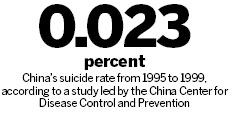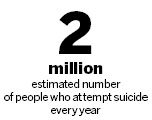Suicide hotlines provide light in the darkness
Since it opened last December, the hotline has received 1,692 calls, with people aged 20 to 40 accounting for about 70 percent of them. Around 20 percent of the callers required urgent "crisis intervention".
The operators of the hotline said severe crises mainly affect people in the 20 to 30 age group, rather than those in the 30 to 40 bracket.
"Nowadays, many young people are suffering psychological crises, but are failing to find a way to solve the problem. In some extreme cases, they choose to end their life," said Lin Kunhui, founder of the Life Education and Crisis Intervention Center and secretary-general of the Taiwan Suicide Prevention and Cure Association.
|
 |
 |
|
 |
 |
A taboo subject
Suicide is a serious problem in China, where at least three people try to kill themselves every minute. Approximately 287,000 Chinese commit suicide every year and a further 2 million attempt the act, according to the National Health and Family Planning Commission.
The problem is exacerbated by the fact that suicide has long been a taboo subject in China, meaning few studies were conducted into it until the 1990s.
A study led by Canadian suicide expert Michael Phillips and the Chinese CDC shows that from 1995 to 1999, the country's suicide rate was 0.023 percent, one of the highest in the world. The study, the largest ever undertaken in China, questioned the families of suicides in 23 locations across the country and discovered that the highest incidence occurred among the elderly and women in rural areas.
The suicide rate dropped in the decade after the report, largely thanks to tighter controls on pesticides - ingestion of which was once the most common method of committing suicide in rural areas - an improved medical support system and widespread public education.
Younger suicides
However, in recent years a spate of suicides among the young has prompted widespread public and official concern.
On Sept 5, an 11-year-old in Fushun, Liaoning province, jumped to his death from the seventh floor of a building after being criticized by his teacher for violating school regulations.
In June, a 15-year-old girl in Guangzhou, Guangdong province, ended her life by jumping from a high building because she was weighed down by the pressure of academic expectation.
Cases such as this have become almost commonplace in the media, with challenges at work, school or college and in relationships given as the prime motives.
The Chinese CDC said suicide is now the top cause of death among people aged 15 to 34. Many observers have speculated that the rise in the number of suicides among young people is due to the increasing levels of stress imposed by families and schools, especially if the victim is the only child in the family and shoulders the burden of expectation alone.
"When struggling with the pressures of study, work and relationships, they need to find some outlet, or those pressures may easily produce emotional anxieties that will increase the likelihood of suicide," said Zhang Qi, deputy director of the psychological counseling center at East China Normal University.
The pattern of suicide is different in China, too. In the United States, roughly 90 percent of people who commit suicide have a history of acute depression or other mental health issues, but in China, only 60 percent of suicides involve people with such a history, according to the study by the Chinese CDC.
"Children are drilled to perform well in school and they often lack adaptability. When they encounter setbacks, they lose heart and some take extreme measures," Zhang said.
In recent years, the government and schools have paid greater attention to the mental health of students and many schools across China now offer counseling sessions.
"Students should be taught more about the value of life and how to deal with adversity," added Zhang.





















